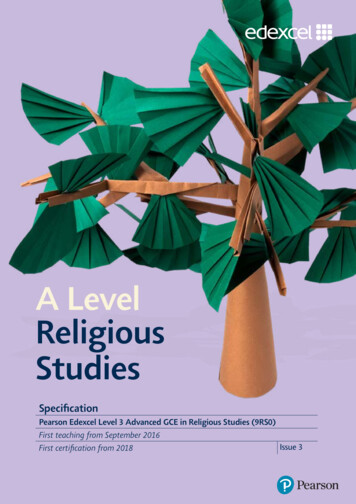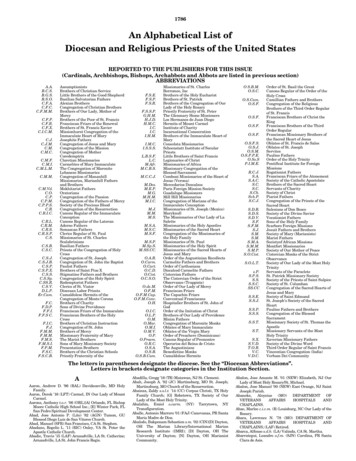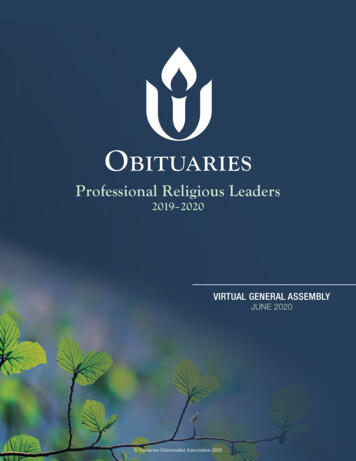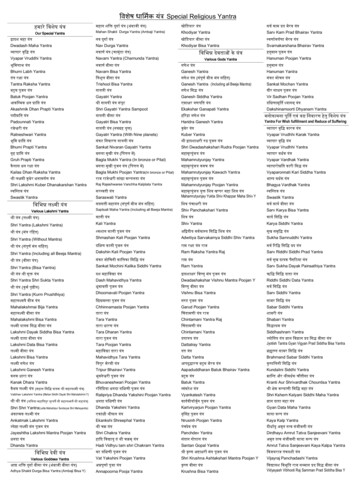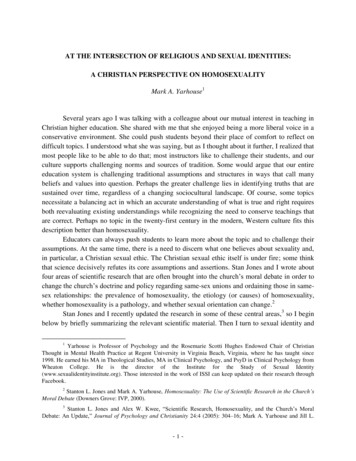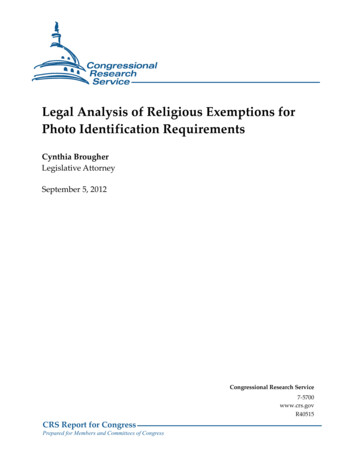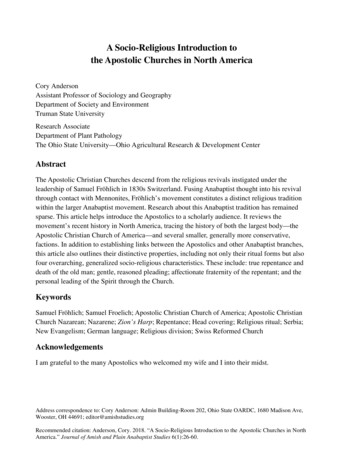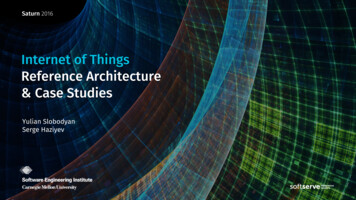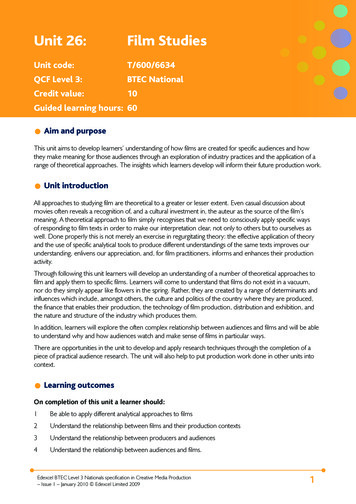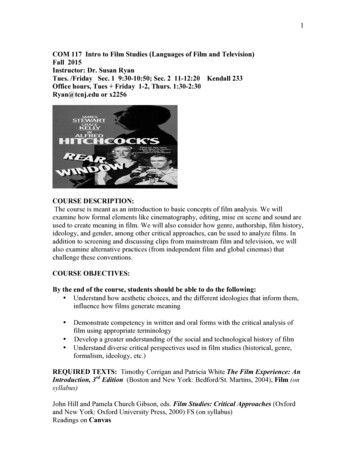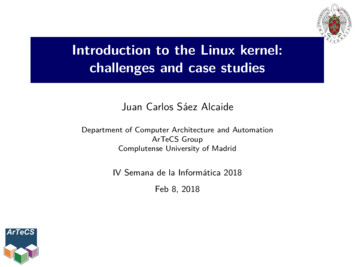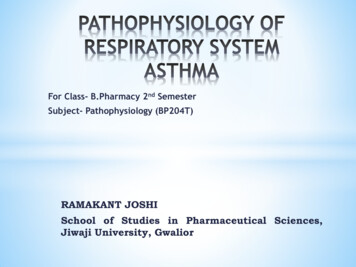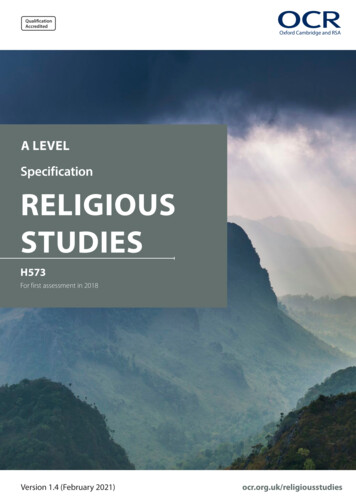
Transcription
QualificationAccreditedOxford Cambridge and RSAA LEVELSpecificationRELIGIOUSSTUDIESH573For first assessment in 2018Version 1.4 (February 2021)ocr.org.uk/religiousstudies
DisclaimerRegistered office: The Triangle BuildingShaftesbury RoadCambridgeCB2 8EAOCR is an exempt charity.Specifications are updated over time. Whilst every effort is made to check alldocuments, there may be contradictions between published resources and thespecification, therefore please use the information on the latest specification atall times. Where changes are made to specifications these will be indicated withinthe document, there will be a new version number indicated, and a summaryof the changes. If you do notice a discrepancy between the specification and aresource please contact us at: resources.feedback@ocr.org.ukWe will inform centres about changes to specifications. We will also publishchanges on our website. The latest version of our specifications will always bethose on our website (ocr.org.uk) and these may differ from printed versions. 2021 OCR. All rights reserved.CopyrightOCR retains the copyright on all its publications, including the specifications.However, registered centres for OCR are permitted to copy material from thisspecification booklet for their own internal use.Oxford Cambridge and RSA is a Company Limited by Guarantee. Registered inEngland. Registered company number 3484466.
ContentsSupport and Guidance Assessment Preparation and Analysis Service 12345iiiiiWhy choose an OCR A Level in Religious Studies? 11a.1b.1c.1d.Why choose an OCR qualification? Why choose OCR’s A Level in Religious Studies? What are the key features of this specification? How do I find out more information? 1233The specification overview 42a.2b.2c.2c.2c.2c.2c.2c.2c.2c.2d.OCR’s A Level in Religious Studies (H573) Content of A Level in Religious Studies (H573) Content of Philosophy of religion (H573/01) Content of Religion and ethics (H573/02) Content of Developments in religious thought (H573/03–07) Content of Developments in Christian thought (H573/03) Content of Developments in Islamic thought (H573/04) Content of Developments in Jewish thought (H573/05) Content of Developments in Buddhist thought (H573/06) Content of Developments in Hindu thought (H573/07) Prior knowledge, learning and progression 4571728294256718498Assessment of A Level in Religious Studies (H573) 993a.3b.3c.3d.3e.3f.3g.Forms of assessment Assessment objectives (AO) Assessment availability Retaking the qualification Assessment of extended response Synoptic assessment Calculating qualification results 99100101101101101101Admin: what you need to know 1024a.4c.4b.4d.4e.4f.Pre-assessment External assessment arrangements Special consideration Results and certificates Post-results services Malpractice 102104104105105105Appendices 1065a.5b.5c.Overlap with other qualifications Accessibility Teaching approaches in context for Developments of Religious Thought (03–07) 106106107Summary of updates 112 OCR 2021A Level in Religious Studiesi
Support and GuidanceIntroducing a new specification brings challenges forimplementation and teaching, but it also opens upnew opportunities. Our aim is to help you at everystage. We are working hard with teachers and otherexperts to bring you a package of practical support,resources and training.Subject AdvisorsOCR Subject Advisors provide information andsupport to centres including specification and nonexam assessment advice, updates on resourcedevelopments and a range of training opportunities.Our Subject Advisors work with subject communitiesthrough a range of networks to ensure the sharing ofideas and expertise supporting teachers and studentsalike. They work with developers to help produce ourspecifications andthe resources needed to support these qualificationsduring their development.You can contact our Religious Studies Subject Advisorsfor specialist advice, guidance and support:01223 g and learning resourcesOur resources are designed to provide you with arange of teaching activities and suggestions thatenable you to select the best activity, approach orcontext to support your teaching style and yourparticular students. The resources are a body ofiiknowledge that will grow throughout the lifetime ofthe specification, they include: Delivery GuidesTransition GuidesTopic Exploration PacksLesson Elements.We also work with a number of leading publisherswho publish textbooks and resources for ourspecifications. For more information on ourpublishing partners and their resources blishing-partnersProfessional developmentOur improved Professional DevelopmentProgramme fulfills a range of needs throughcourse selection, preparation for teaching, deliveryand assessment. Whether you want to look at ournew digital training or search for training materials,you can find what you’re looking for all in one place atthe CPD Hub: cpdhub.ocr.org.ukAn introduction to new specificationsWe run training events throughout the academicyear that are designed to help prepare you for firstteaching and support every stage of your delivery ofthe new qualifications.To receive the latest information about the trainingwe offer on GCSE and A Level, please register foremail updates at: ocr.org.uk/updates OCR 2021A Level in Religious Studies
Assessment Preparation and Analysis ServiceAlong with subject-specific resources and tools, you’llalso have access to a selection of generic resourcesthat focus on skills development, professionalguidance for teachers and results data analysis.ExamBuilderEnabling you to build, mark and assess testsfrom OCR exam questions and produce acomplete mock GCSE or A Level exam.Find out more at ocr.org.uk/exambuilderSubject Advisor SupportOur Subject Advisors provideyou with access to specifications,high-quality teaching resourcesand assessment materials.Skills GuidesThese guides cover topics thatcould be relevant to a rangeof qualifications, for examplecommunication, legislationand research.Download the guides atocr.org.uk/skillsguides OCR 2021A Level in Religious StudiesPractice PapersAssess students’ progress underformal examination conditionswith question papers downloadedfrom a secure location, well-presented,easy-to-interpret mark schemesand commentary on marking andsample answers.Active ResultsOur free online results analysisservice helps you review theperformance of individual studentsor your whole cohort. For moredetails, please refer toocr.org.uk/activeresultsiii
iv OCR 2021A Level in Religious Studies
1Why choose an OCR A Level in Religious Studies?1a. Why choose an OCR qualification?Choose OCR and you’ve got the reassurance thatyou’re working with one of the UK’s leading examboards. Our new A Level in Religious Studies coursehas been developed in consultation with teachers,employers and Higher Education to provide learnerswith a qualification that’s relevant to them and meetstheir needs.to encourage learners to become responsible fortheir own learning, confident in discussing ideas,innovative and engaged.We’re part of the Cambridge AssessmentGroup, Europe’s largest assessment agency anda department of the University of Cambridge.Cambridge Assessment plays a leading role indeveloping and delivering assessments throughoutthe world, operating in over 150 countries. A wide range of high-quality creative resourcesincluding:oDelivery Guides oTransition Guides oTopic Exploration Packs oLesson Elements o. . . and much more. Access to Subject Advisors to support youthrough the transition and throughout thelifetime of the specification. CPD/Training for teachers to introduce thequalifications and prepare you for firstteaching.We believe in developing specifications that help youbring the subject to life and inspire your learners toachieve more. Active Results – our free results analysisservice to help you review the performanceof individual learners or whole schools.We’ve created teacher-friendly specificationsbased on extensive research and engagement withthe teaching community. They’re designed to bestraightforward and accessible so that you can tailorthe delivery of the course to suit your needs. We aimAll A Level qualifications offered by OCR areaccredited by Ofqual, the Regulator for qualificationsoffered in England. The accreditation number forOCR’s A Level in Religious Studies is QN:601/8868/6.We work with a range of education providers,including schools, colleges, workplaces and otherinstitutions in both the public and private sectors.Over 13,000 centres choose our A Levels, GCSEsand vocational qualifications including CambridgeNationals and Cambridge Technicals.We provide a range of support services designed tohelp you at every stage, from preparation throughto the delivery of our specifications. This includes:Our Specifications OCR 2021A Level in Religious Studies11
1b. Why choose OCR’s A Level in Religious Studies?1OCR’s A Level in Religious Studies has been developedin consultation with teachers and stakeholders froma variety of institutions. The content has beendesigned to provide a coherent and thoughtprovoking programme of study for both teachersand learners, whilst also acting as a rigorous courseof study which prepares learners for progression toHigher Education.This qualification is designed to develop a greaterunderstanding and appreciation of religious beliefsand teachings, as well as the disciplines of ethicsand philosophy of religion. Learners will developtheir skills of critical analysis in order to constructbalanced, informed arguments and responses toreligious, philosophical and ethical ideas.OCR’s A Level Religious Studies course aims toengage learners thoroughly and develop aninterest in Religious Studies which extends beyondthe classroom and can be applied to the worldaround them.Aims and learning outcomesOCR’s A Level in Religious Studies will encouragelearners to: develop their interest in a rigorous studyof religion and belief and relate it to thewider world develop knowledge and understandingappropriate to a specialist study of religion2 develop an understanding and appreciation ofreligious thought and its contribution toindividuals, communities and societies adopt an enquiring, critical and reflectiveapproach to the study of religion reflect on and develop their own values,opinions and attitudes in the light of their study. OCR 2021A Level in Religious Studies
1c.What are the key features of this specification?The key features of OCR’s A Level in ReligiousStudies are: three components, each with clear andwell-defined content and strong supportingmaterials a choice of five major world religions for indepth study, allowing you to choose the mostappropriate and interesting approach for youand your learners a co-teachable specification allowing forthe AS Level in Religious Studies to be taughtalongside the first year of the A Level the encouragement to develop learners’understanding of the modern world andestablish a deeper knowledge and appreciationof world religions the opportunity for learners to apply theirknowledge and skills to contemporary issues,creating an up-to-date and thoroughlyrelevant course a focus on inspiring and motivating learners,while challenging and developing theirperceptions of different world religions an emphasis on enabling learners torespond critically and engage with a wealth ofphilosophical, ethical and religious concepts,equipping them with analytical skills readilytransferable to other subjects.1d. How do I find out more information?If you are already using OCR specifications you cancontact us at: www.ocr.org.ukIf you are not already a registered OCR centre thenyou can find out more information on the benefits ofbecoming one at: www.ocr.org.ukIf you are not yet an approved centre and would liketo become one go to: www.ocr.org.uk OCR 2021A Level in Religious StudiesWant to find out more?Ask a Subject Advisor:Email: religiousstudies@ocr.org.ukTeacher support: 01223 553998Visit our Online Support Centre at support.ocr.org.ukSign up for the e-bulletin:www.ocr.org.uk/updates31
2The specification overview2a. OCR’s A Level in Religious Studies (H573)Learners take components 01 and 02 and one from 03 to 07, to be awarded the OCR A Level in Religious Studies.Content Overview2Philosophy of religionLearners will study: ancient philosophical influences the nature of the soul, mind and body arguments about the existence or non-existenceof God the nature and impact of religious experience the challenge for religious belief of the problemof evil ideas about the nature of God issues in religious language.Religion and ethicsLearners will study: normative ethical theories the application of ethical theory to twocontemporary issues of importance ethical language and thought debates surrounding the significant idea ofconscience sexual ethics and the influence on ethical thoughtof developments in religious beliefs.Developments in religious thoughtLearners will study: religious beliefs, values and teachings, theirinterconnections and how they vary historicallyand in the contemporary world sources of religious wisdom and authority practices which shape and express religiousidentity, and how these vary within a tradition significant social and historical developments intheology and religious thought key themes related to the relationship betweenreligion and societyAssessment OverviewPhilosophy ofreligion(01)120 marks2 hour written paperReligion and ethics(02)120 marks2 hour written paperDevelopments inreligious thought(03–07)120 marks2 hour written paper33.3%of totalA Level33.3%of totalA Level33.3%of totalA Levelin the context of one religion chosen from Christianity(03), Islam (04), Judaism (05), Buddhism (06) orHinduism (07).4 OCR 2021A Level in Religious Studies
2b. Content of A Level in Religious Studies (H573)The OCR A Level in Religious Studies will build onthe knowledge, understanding and skills establishedat GCSE (9–1). Learners will be introduced to amore advanced approach to Religious Studies, andwill develop a deeper understanding of the beliefs,teachings and philosophy they study.All learners will study three components;Philosophy of religion (01), Religion and ethics (02)and Developments in religious thought (03–07).Whilst Components 01 and 02 are mandatory, thethird will be chosen from the five available options;Christianity (03), Islam (04), Judaism (05), Buddhism(06) or Hinduism (07).In Philosophy of religion learners will studyphilosophical issues and questions raised by religionand belief. These include arguments regarding theexistence or non-existence of God, the nature andinfluence of religious experience and the problems of OCR 2021A Level in Religious Studiesevil and suffering. They will also explore philosophicallanguage and thought, through significant conceptsand the works of key thinkers, illustrated in issues ordebates in the philosophy of religion.Religion and ethics is characterised by the study ofethical language and thought, with exploration of keyconcepts and the works of influential thinkers. Ethicaltheory will also be applied to issues of importance;namely euthanasia, business ethics, and sexual ethics.Developments in religious thought provides anopportunity for the systematic study of one religioustradition. This will include the exploration of religiousbeliefs, values, teachings and practices that shapereligious identity, as well as sources of wisdom andauthority. Also central are the ways in which religioustraditions have developed over time, and religiousresponses to challenges and significant contemporarysocial issues.52
Using this specification documentAll components are divided into six sections, eachcontaining one or two topics depending on thebreadth of the material. All six sections containequivalent material in terms of scope, complexity2and anticipated teaching time. Topics marked withan asterisk (*) are common to the AS and A Levelcourses, although assessed at different levels.Content, Key Knowledge and Discussion SectionsThe column headed ‘Content’ details the focus ofeach topic and provides information on the mainareas of study.‘Key Knowledge’ provides details of the knowledgeexpected of learners. This third column is included toprovide support and transparency for both teachersand students; making it clear what students shouldstudy and providing helpful guidance should anyconcepts be unfamiliar to teachers.Finally, each topic ends with a section detailingdiscussion points based on the content. While it isanticipated that discussions of these interesting,relevant and engaging topics will range widely, thelisted points are considered to be central debatesand issues appropriate for assessment.These three sections for each topic combine to givea clear outline to teachers and learners of materialthat is essential for study. Where scholars and textsare stated in the “Key Knowledge” or “Content”sections it is expected that learners would havesufficient knowledge of these to answer a questiondirectly referencing them.TextsAt the bottom of each topic is a box containinghelpful text references. These are intended asguidance only and detailed knowledge of these textsis not expected, and questions will not be set directlyreferencing them.Contextual ReferencesWhere an individual or their views is cited as withinthe “Content” or “Key Knowledge” sections we havegiven context and references for their ideas underthis heading. This is to enable teachers, should theywish, to work from the primary source material ofthese thinkers or easily locate the ideas for theirown reference.Suggested scholarly views, academic approaches andsources of wisdom and authorityhelpful guide to the type of material teachers maywish to use. Items on these lists will not be directlyreferenced in assessment materials, or specificallyexpected in responses, but have been included toexemplify the kind of material learners may use tosupport their answers. This is not to be taken as adefinitive or prescriptive list.The Levels of Response grids, used for the marking ofassessments, credit learners for use of “scholarlyviews, academic approaches and sources of wisdomand authority” to support their arguments. Learnerswill be given credit for referring to any appropriatescholarly views, academic approaches and sources ofwisdom and authority, not only those suggested inthe specification document.This list is included in order to support teachers.These should be considered a ‘starting point’ or6 OCR 2021A Level in Religious Studies
2c.Content of Philosophy of religion (H573/01)This component explores philosophical issues andquestions raised by religion and belief.such experiences, as well as how they can shapereligious belief.Ancient philosophical influences provides importantfoundational knowledge for the study of philosophyof religion. This and Soul, mind and body enable theexploration of philosophical language and thoughtthrough significant concepts and the works of keythinkers.The problem of evil and suffering will also beexplored. Debated for millennia, this issue isstill relevant and problematic for many today.Learners will critically analyse three contrastingarguments regarding the existence of God. Sucharguments are a fundamental element of philosophyof religion, as well as key to the personal beliefs ofmany individuals.Learners will also be introduced to different typesof religious experience, and will be encouraged todiscuss and debate the significance and meaning of2Through studying the nature of God, learners willexplore how ideas within philosophy of religionhave developed over time, and make comparisonsbetween the ideas presented in works of keyscholars.Finally, the two sections that focus on religiouslanguage give learners the opportunity to examineissues such as whether religious teachings should beunderstood symbolically or analogically, or whetherreligious language should be regarded cognitively ornon-cognitively.Technical TermsWhile the majority of non-English terms (which arenot names of texts, philosophical schools or particularreligious approaches) within the specification andassessment materials will be accompanied by atranslation, there are some which are considered tobe key technical terms that learners are expectedto recognise and understand without a providedtranslation. OCR 2021A Level in Religious StudiesFor this component the following are consideredtechnical terms and will not necessarily beaccompanied by a translation: a posterioria priorivia negativavia positiva.7
1. Philosophical Language and ThoughtLearners will study significant concepts and issues in the philosophy of religion through the works ofkey s* Key Knowledgethe philosophical views ofPlato, in relation to:ounderstanding of reality Plato’s reliance on reason as opposed to thesensesothe Forms the nature of the Forms; hierarchy of the Formsot he analogy of thecave details of the analogy, its purpose and relation tothe theory of the Forms Aristotle’s use of teleologythe philosophical views ofAristotle, in relation to:ounderstanding of realityothe four causes material, formal, efficient and final causesothe Prime Mover the nature of Aristotle’s Prime Mover andconnections between this and the final causeLearners should have the opportunity to discuss issues related to the ideas of Plato andAristotle, including: comparison and evaluation of Plato’s Form of the Good and Aristotle’s Prime Mover comparison and evaluation of Plato’s reliance on reason (rationalism) and Aristotle’suse of the senses (empiricism) in their attempts to make sense of realityContextual referencesFor reference, the ideas of Plato and Aristotle listed above can be found in: Plato, Republic Book 474c–480; 506b–509c; 509d–511e; 514a–517c Aristotle, Physics II.3 and Metaphysics V.2Suggested scholarly views, academic approaches and sources of wisdom and authorityLearners will be given credit for referring to any appropriate scholarly views, academicapproaches and sources of wisdom and authority, however the following examples mayprove useful Annas, J. (1998) An Introduction to Plato’s Republic, Oxford University Press,Chapters 9 and 10 Stanford Encyclopedia of Philosophy (2004, rev.2013), Plato, http://plato.stanford.edu/entries/plato/8 OCR 2021A Level in Religious Studies
TopicContentKey KnowledgeSoul, mindand body* the philosophical languageof soul, mind and body inthe thinking of Plato andAristotlemetaphysics ofconsciousness, including:osubstance dualism omaterialism Plato’s view of the soul as the essential andimmaterial part of a human, temporarily unitedwith the bodyAristotle’s view of the soul as the form of thebody; the way the body behaves and lives;something which cannot be separated fromthe body2the idea that mind and body are distinctsubstancesDescartes’ proposal of material and spiritualsubstances as a solution to the mind/soul andbody problemthe idea that mind and consciousness can befully explained by physical or materialinteractionsthe rejection of a soul as a spiritual substanceLearners should have the opportunity to discuss issues related to ideas about soul, mindand body, including: materialist critiques of dualism, and dualist responses to materialism whether the concept of ‘soul’ is best understood metaphorically or as a reality the idea that any discussion about the mind-body distinction is a category errorContextual referencesFor reference, the ideas Descartes listed above can be found in: Descartes, Principles of Philosophy, I.60–65Suggested scholarly views, academic approaches and sources of wisdom and authorityLearners will be given credit for referring to any appropriate scholarly views, academicapproaches and sources of wisdom and authority, however the following examples mayprove useful Blackmore, S. (2010) Consciousness; an introduction, Routledge, Chapters 1, 2and 17 Ryle, G. (1949 – many editions available) The Concept of Mind, Chapter 1 Stanford Encyclopedia of Philosophy (2003 rev. 2009) Ancient Theories of theSoul http://plato.stanford.edu/entries/ancient-soul/ OCR 2021A Level in Religious Studies9
2. The Existence of GodLearners will study contrasting arguments about the existence or non-existence of God2TopicContentKey KnowledgeArgumentsbased onobservation* the teleological argument details of this argument including reference to:oAquinas’ Fifth Way oPaley the cosmological argument details of this argument including reference to:oAquinas’ first three ways challenges to argumentsfrom observation details of Hume’s criticisms of these argumentsfor the existence of God from natural religionthe challenge of evolution Learners should have the opportunity to discuss issues related to arguments for theexistence of God based on observation, including: whether a posteriori or a priori is the more persuasive style of argument whether or not teleological arguments can be defended against the challengeof ‘chance’ whether cosmological arguments simply jump to the conclusion of a transcendentcreator, without sufficient explanation whether or not there are logical fallacies in these arguments that cannot be overcomeContextual referencesFor reference, the ideas of Aquinas, Paley and Hume listed above can be found in: Aquinas, Summa Theologiae, I.2.3 Paley, Natural Theology Chapters 1 and 2 Hume, Dialogues Concerning Natural Religion Part IISuggested scholarly views, academic approaches and sources of wisdom and authorityLearners will be given credit for referring to any appropriate scholarly views, academicapproaches and sources of wisdom and authority, however the following examples mayprove useful Dawkins, R. (1991) The Blind Watchmaker, Penguin, Chapter 1 Palmer, M. (2002) The Question of God, Routledge, Chapters 2 and 310 OCR 2021A Level in Religious Studies
TopicContentKey KnowledgeArgumentsbased onreason* the ontological argumentdetails of this argument including reference to:oAnselm oGaunilo’s criticisms oKant’s criticisms Learners should have the opportunity to discuss issues related to arguments for theexistence of God based on reason, including: whether a posteriori or a priori is the more persuasive style of argument whether or not existence can be treated as a predicate whether or not the ontological argument justifies belief whether or not there are logical fallacies in this argument that cannot be overcome2Contextual referencesFor reference, the ideas of Anselm, Gaunilo and Kant listed above can be found in: Anselm, Proslogion 2 and 3 Gaunilo, In behalf of the fool Kant, A critique of pure reason, Second Division III.IVSuggested scholarly views, academic approaches and sources of wisdom and authorityLearners will be given credit for referring to any appropriate scholarly views, academicapproaches and sources of wisdom and authority, however the following examples mayprove useful Psalm 14.1 Van Inwagen, P. ‘Necessary Being: the Ontological Argument’ in Stump, E andMurray, M. J. (ed) (1999) Philosophy of Religion: The Big Questions, Blackwell Plantinga, A. (1978) God, Freedom and Evil, Grand Rapids, II.c OCR 2021A Level in Religious Studies11
3. God and the WorldLearners will study the nature and influence of religious experience,and the challenge posed to religious belief by the problems of evil and suffering2TopicContentReligiousexperience* the nature and influence ofreligious experience,including:omystical experience oconversion experience different ways in whichindividual religiousexperiences can beunderstoodKey Knowledge examples of mystical and conversionexperiences and views about these, including:oviews and main conclusions of William James as union with a greater powerpsychological effect such as illusionthe product of a physiological effectLearners should have the opportunity to discuss issues related to religious experience,including: whether personal testimony or witness is enough to support the validity of religiousexperiences whether or not corporate religious experiences might be considered more reliable orvalid than individual experiences whether or not religious experience provides a basis for belief in God or a greaterpowerContextual referencesFor reference, the ideas of William James listed above can be found in: James, W. The Varieties of Religious Experience, lectures 9,10,16,17 and 20Suggested scholarly views, academic approaches and sources of wisdom and authorityLearners will be given credit for referring to any appropriate scholarly views, academicapproaches and sources of wisdom and authority, however the following examples mayprove useful Acts 9.4–8, 22.6–10, 26 Otto, R. (1923/1968) The Idea of the Holy, Oxford University Press, Chapters 4and 5 Saint Teresa of Avila, from The Autobiography of Saint Teresa (1960/2010)Allison Peers, E. (ed. and trans.) Dover Publications12 OCR 2021A Level in Religious Studies
TopicContentThe problemof evil* Key Knowledgethe problem of evil andsuffering:odifferent presentations ot heodicies that proposesome justification orreason for divine actionor inaction in the faceof evil including its logical (the inconsistency betweendivine attributes and the presence of evil) andevidential (the evidence of so much terrible evilin the world) aspects Augustine’s use of original perfection andthe FallHick’s reworking of the Irenaean theodicy whichgives some purpose to natural evil in enablinghuman beings to reach divine likeness Learners should have the opportunity to discuss issues related to the problem of evil,including: whether or not Augustine’s view of the origins of moral and natural evils is enough tospare God from blame for evils in the world whether or not the need to create a ‘vale of soul-making’ can justify the existence orextent of evils which of the logical or evidential aspects of the problem of ev
These guides cover topics that could be relevant to a range of qualifications, for performance of individual studentsexample communication, legislation and research. Download the guides at ocr.org.uk/skillsguides Subject Advisor Support Our Subject Advisors provide you with
